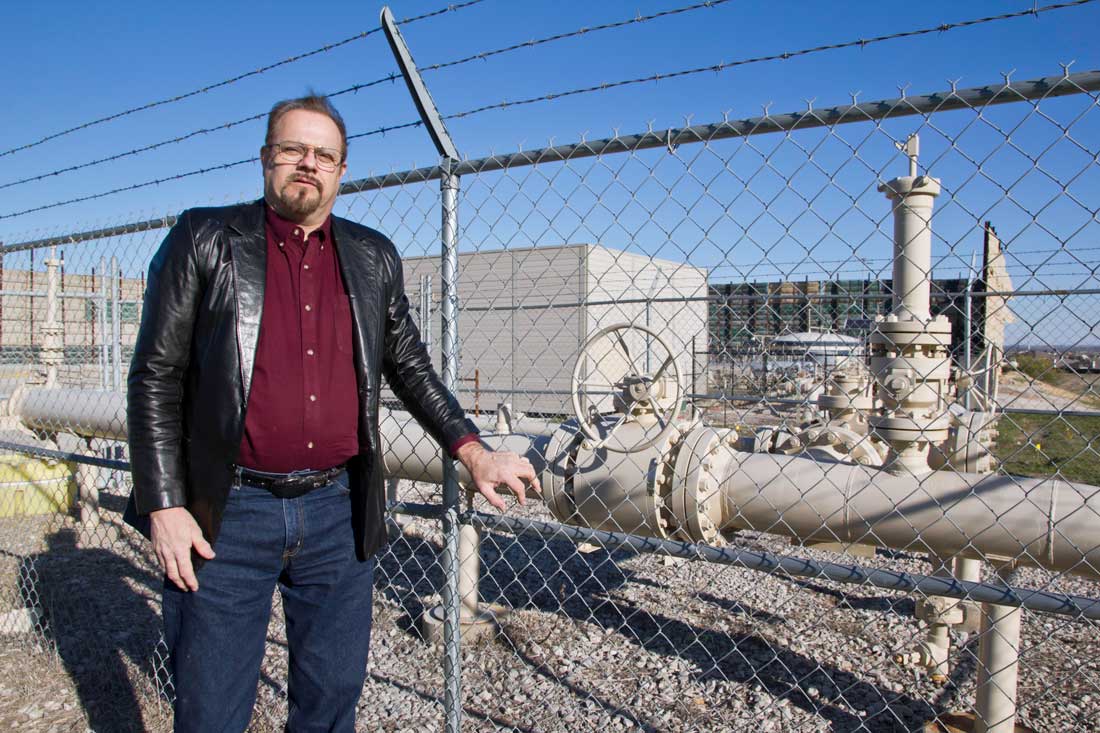It’s a truism of the Texas Legislature that killing “bad” legislation is as important as passing the “good” kind. Under that theory, it would seem that critics of the shale gas industry would be celebrating the fact that two bills intended to limit the power of Texas cities to regulate pipelines and oil and gas wells are stuck in committee and not expected to pass.
That theory, however, doesn’t take into account another Austin reality: In the closing days of a legislative session, almost anything can happen. One veteran reporter described those final days as being like “an Oklahoma land rush” with hundreds of bills being shoved through the process at top speed. Including, possibly, measures to limit cities’ home-rule powers, tacked on as amendments to other pieces of legislation.
That’s what State Rep. Lon Burnam is on the watch for, as the calendar counts down toward adjournment on May 27.
“Amendments are put on bills all the time at the last minute of the session,” Burnam said, when legislators don’t always have time to read and consider them closely. “I have no doubt in my mind that the gas and oil industries will do everything in their power to make that happen.”
He and others, meanwhile, are wondering why Fort Worth city leaders haven’t done more to defeat the two measures.
“The city of Fort Worth was almost AWOL on the battle,” Burnam said. “On this issue the city continued to fail public health and safety issues across the board.”
The pipeline bill, co-authored by Republican legislators Tony Dale of Cedar Park and Phil King of Weatherford, would amend the state utilities code to prohibit any city with home-rule authority (that is, all but the smallest towns) from enacting rules or ordinances to interfere in any way with the Texas Railroad Commission’s authority over the gas pipeline industry.
The second, bill, by State Rep. Van Taylor of Plano, would prohibit home-rule cities from “preventing or prohibiting the development of an oil or gas well that has been permitted by the Texas Railroad Commission.”
Gary Hogan, who served on both of Fort Worth’s gas drilling ordinance task forces, said he was “amazed that our city representative … did not vehemently testify” in opposition to the pipeline bill.
Hogan said he was assured by City Attorney Sarah Fullenwider and Randle Harwood, director of the city’s Planning and Development Department, that city hall representatives would testify against both bills.
But Fullenwider told Fort Worth Weekly that no one representing the city testified against the pipeline bill.
Harwood said that while the city opposed both bills, Senior Assistant City Attorney Christa Reynolds testified only against the bill that would remove the already limited power that cities have over gas and oil wells. It’s an area where Fort Worth does little regulating as it is.
City spokesperson Jason Lamers explained that T.J. Paterson, Fort Worth’s manager of legislative affairs, alerted city officials to both bills and notified the Energy Resources Committee staff that the city would provide testimony against the pipeline bill, if needed. But he said it turned out that city officials’ testimony wasn’t needed to keep the bill in committee.
However, keeping the bills in their respective committees was an enormous challenge, said Calvin Tillman, the former mayor of DISH and one of three witnesses who testified against the pipeline measure, HB2828, in early April.
“You cannot imagine how much time and effort went into opposing this bill,” he told the Weekly.
In his testimony, Tillman noted that supporters of the bill had described it as preventing cities around the state from imposing a hodgepodge of regulations on pipeline companies.
“That is understandable,” Tillman said, but it’s not what the bill would do. Texas cities are already pre-empted by state and federal law from imposing safety standards on pipelines, he said.
What the bill would actually do, he said, would be to prevent city ordinances of any type relating to the gas pipeline industry, effectively destroying cities’ ability to implement comprehensive plans or zoning and potentially turning many communities into heavy industrial areas.
Sharon Wilson, a well-known blogger about the drilling industry and Texas representative for the Oil and Gas Accountability Project, agreed with Tillman’s assessment but said the bill does even more.
“If that bill passes or is attached as an amendment to another bill which passes,” she said, “it will open the door to other industries claiming they were treated unfairly by municipalities and subsequently getting exceptions as well, until nothing could be regulated by the cities themselves.”
The Weekly contacted several groups representing the oil and gas industry, including the Barnett Shale Energy Education Council, but got no response to requests for comment.
Retired physicist and outspoken urban gas drilling critic Jerry Lobdill wrote in an e-mail that the city council had behaved as if the two bills did not exist. “They ignored it and no doubt hoped that we would ignore it too,” he said. “The conclusion is that they serve the oil and gas industry, not the public.”
Several observers, including Burnam, said the most likely piece of legislation for the home-rule limitations to be attached to would be what’s known as the sunset bill for the Texas Railroad Commission, essentially authorizing the continued operation of that agency, the state’s main regulatory body over the gas drilling and pipeline industries.
The Railroad Commission sunset bill has been passed by the Senate and sent to the House. If the House amends the bill — such as by adding the home-rule limitations — the measure would then have to go back to the Senate for consideration of those changes. If the Senate doesn’t approve all the changes, the bill would go to a conference committee to hammer out a compromise. Any compromise would then have to be approved by both houses before being sent to the governor.
Burnam said he will be looking for last-minute changes to the sunset bill and other legislation to which the home-rule limits could be attached.
“I will be monitoring … amendments on the floor,” he said.













Refresh my memory. Isn’t council member Danny Scarth the chair of the legislative committee? THAT WOULD EXPLAIN A GREAT DEAL!
If our legislators met year round or at least every year for 6 months maybe there wouldn’t be so much of the usual last minute rush to get bills out of committee. Our state is too big and too complicated in the 21st Century to only meet every other year. Most people have no idea what is going on in Austin.
Our local news programs hardly mention the critical work that will affect all Texans for many years to come. Watching the legislative committee meetings with the currently antiquated online system requires a lot of patience. They place the cameras in the back of the room and the people that testify are never shown from the front. The legislators are a big blur.
Our large cities do a much better job than our state. With Austin being such a progressive city, it’s shameful that technology continues to be such a HUGE issue for our state ~ especially when most Texans can’t get to Austin. All of this keeps us entrenched in a time warp.